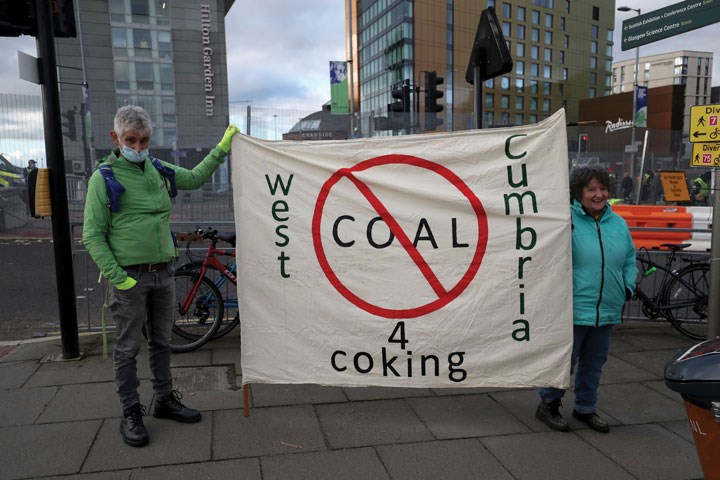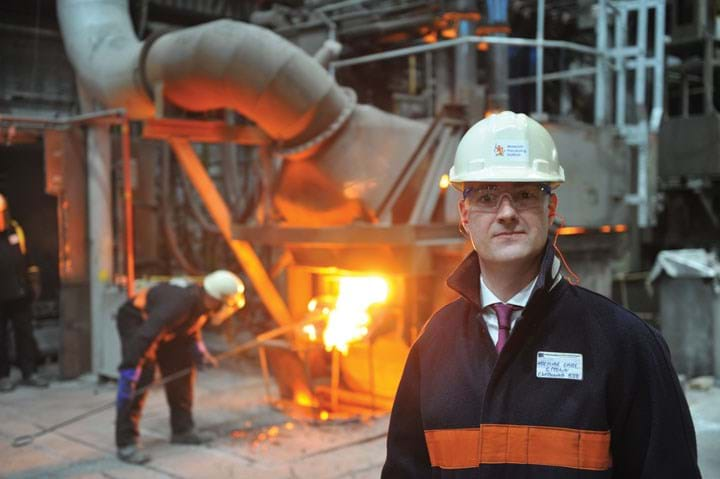Engineers: Raise Your Voice

More chemical engineers are needed in industrial policy, says Chris McDonald
THE announcement that the UK is set to open a new coal mine in Cumbria has seen the steel industry drawn unwillingly into a debate that attempts to pit jobs and the economy against the climate. Yet for those of us who work in the steel sector, we know that the kind of policy we need is one that supports green investment, as we move quickly away from coal.
Coal has been an essential part of steel production for 200 years, with metallurgical coke used to reduce iron ore in the blast furnace. This use of coal, combined with the large scale of global steel production, is why the industry accounts for more than 10% of CO2 emissions worldwide. Decarbonisation for the steel sector is about more than fuel switching, it requires a complete replacement of the current process and that is why governments around the world are supporting research and innovation activity in zero carbon steelmaking, as well as co-investing with steel companies in renewing their plant and equipment. The frontrunner technology is the electric arc furnace (EAF) process, which previously has been used primarily to recycle scrap steel, in combination with a hydrogen reduction furnace that can carry out the iron ore reduction and produce a raw material feedstock that is suitable for EAF melting. Natural gas looks to be an important transition fuel, as blast furnaces across Europe are set to be replaced initially with gas-based reduction furnaces, before a final switch to hydrogen from the mid-2030s onwards.
Decarbonisation for the steel sector is about more than fuel switching, it requires a complete replacement of the current process

The role of chemical engineer
There is clearly an important role here for professional chemical engineers, in working out the process thermodynamics and kinetics of these new reduction processes, optimising the reactor design and scaleup, and establishing safe and efficient methods of process operation. The process know-how developed as part of these investigations, will become crucial to maintaining a sustainable competitive advantage for companies in the sector.
Some of the technical challenges associated with this switch are quite significant. Research over many decades has enabled the blast furnace to cope, both technically and economically, with a wide range of iron ore qualities. The blast furnace is a hugely flexible and forgiving process. Gas-based reduction furnaces, however, are not. They require a premium, pelletised diet, produced from only the finest of iron ores. So fine in fact that it is currently believed that less than 5% of known iron ore reserves are suitable for use in these furnaces. Gaining the necessary process know-how to achieve this will be critical to ensuring that a nation’s steel industry can not only compete economically, but find sufficient raw materials at all.
Our political thinkers talk of post-industrialisation and service-centred economies, as if this were a good thing, and deindustrialisation as if it were an inevitability, when in fact it is a choice
Engineering voices for a green industrial revolution
In addition to these technology challenges there is another important role here for chemical engineers too, in the field of public policy, where engineering voices are not widely heard and where the UK is already at a serious disadvantage.
Over a period of 40 years, successive UK governments have largely refused to engage in industrial strategy, believing this to be a function only of the market. This historic failure of policy has resulted in a level of de-industrialisation in the UK that sees our steel sector now on a par with that of Belgium, a county with one sixth of our population. Our reluctance to embed industrial strategy in our national thinking, comes from a misconception, uniquely held in the UK, that economic progress turns from manufacturing, to services, to financial services, whilst every other nation in the world realises that wealth is built on a foundation of industry that also builds community cohesion. In this high technology, green industrial revolution, as in all previous technology revolutions, those nations and people that will become secure and prosperous, will be those that have a strong manufacturing base, supported by, not driven by, sophisticated services and financial services.

Our political thinkers talk of post-industrialisation and service-centred economies, as if this were a good thing, and deindustrialisation as if it were an inevitability, when in fact it is a choice. Our economic policy has been set based on maximising our comparative advantage, an approach that has seen the UK maximise the potential of our financial services sector, but at the expense of widening inequality – an inequality that now sees 40% of children in my home region of North East England growing up in poverty.
A recent report from the Resolution Foundation, Stagnation Nation, showed that this shift to a services-focused economy has resulted in the UK being the most unequal advanced country in Europe. The report rightly points out that Britain is the second-largest services exporter in the world, after the US, and thus labels the UK a “services superpower”. But this is a strange conclusion given the facts. Whilst services do account for a good chunk of our income earned abroad, it is manufacturing which accounts for more than 50% of the value of our exports despite the sector making up less than 20% of the British economy. Surely then, it is manufacturing, not services, that is doing the heavy lifting on Britain’s balance of trade: manufacturing, not services, which is the true “export superpower”.
More than this, manufacturing and industry accounts for 70% of UK business R&D spend, has higher productivity, pays on average £19,000 per year higher wages, and in places like Teesside where my Institute is based, earnings for high-skilled, high-waged industrial jobs are 45% higher than regional averages in the service sector. The report clearly identifies a manufacturing-shaped hole in our economy - but lacks the ambition to fill it. If we are going to tackle inequality now, then we can’t expect to keep on doing the same thing and get a different result. Instead, we need to put back the piece that has been missing for so long from our economic plan – industrial strategy. Deindustrialisation has also exposed the UK to serious threats to our sovereign capability, to provide even for basic needs. Both the Covid-19 pandemic and the war in Ukraine have revealed the vulnerability of our supply chains, with reliance on potentially hostile and unstable nations, for essentials such as energy, food and materials.

I spend around half my week in London talking to parliamentarians, opinion formers, officials and policy advisers about the importance of our industrial base. I have found many sympathetic and understanding people, particularly amongst the ranks of politicians. Yet I am concerned with the default position taken within many of our public institutions that continue to disregard the basic foundations of industry. Until we can create a paradigm shift within government departments, academia, thinktanks and the media – and yes within industry itself – then these issues will not be addressed. This is why we need to hear more engineering voices in the public space and I call on my fellow chemical engineers to contribute to this debate and add their voices, by engaging with politicians and contributing to policy consultations.
We need a UK industrial strategy set by the needs of our long-term political, economic and national security priorities. Now is the time to make decisions that are genuinely in the national interest and prioritise industrial strategy as essential to a more fair and equal society, in a green economy.
Recent Editions
Catch up on the latest news, views and jobs from The Chemical Engineer. Below are the four latest issues. View a wider selection of the archive from within the Magazine section of this site.




